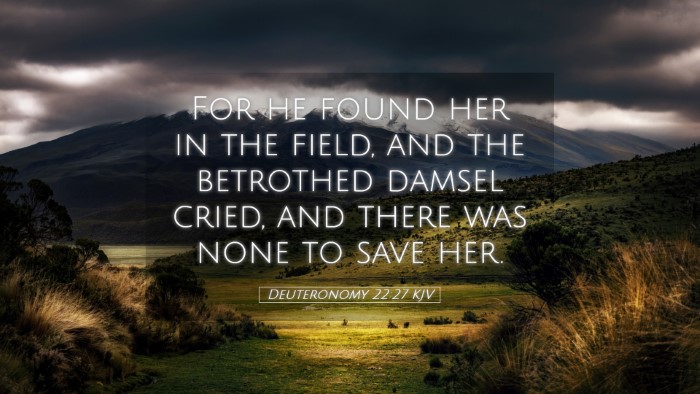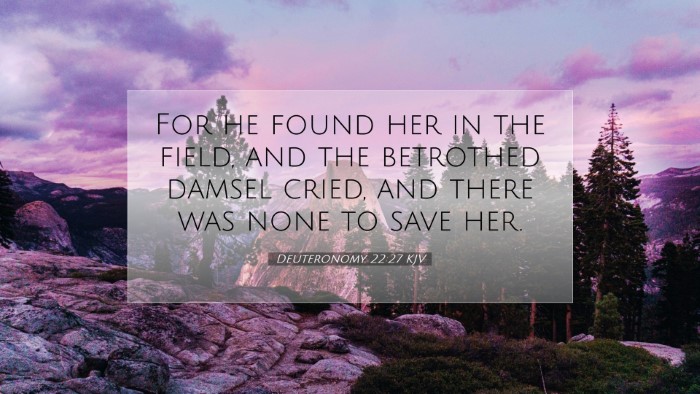Commentary on Deuteronomy 22:27
Text of the Verse: "For he found her in the field, and the betrothed damsel cried, and there was none to save her." (Deuteronomy 22:27, KJV)
Introduction
Deuteronomy 22:27 presents a sobering scenario regarding sexual violence, particularly the situation of a betrothed young woman who is assaulted in the field. This verse encapsulates the moral and ethical considerations surrounding such actions, reflecting the law given to Israel regarding purity, justice, and community accountability.
Contextual Understanding
To appreciate the depth of this verse, one must consider the context in which it was given. Deuteronomy serves as a renewal of the covenant between God and Israel, with an emphasis on laws that govern social and ethical behavior. Chapter 22 specifically addresses various aspects of community life that relate to moral conduct, including sexual ethics, family integrity, and communal responsibility.
Historical Background
In ancient Israelite society, the condition of a woman was often tied to her marital status and purity. The law emphasized protecting these values, as they were crucial for maintaining social order and the covenant community's identity. The case illustrated in this verse addresses not only the grievous act of violation but also the social implications it carried.
Theological Implications
Moral Responsibility: This passage underscores the moral obligation of individuals and the community in addressing and preventing acts of violence. The phrase "there was none to save her" highlights the extreme isolation faced by the victim in her moment of need, reflecting a communal failure in protection and support.
God's Justice
The justice of God as articulated in the law is an essential theme of Deuteronomy. Matthew Henry comments that while this law may seem harsh, it carries the weight of divine justice. An implication of this verse is that God sees all injustices, and there will be accountability for those who take advantage of the vulnerable.
Commentary Insights
Matthew Henry's Insight
Matthew Henry emphasizes the accountability each individual has towards the preservation of purity within the community. He notes that the law intends to safeguard women and to deter potential aggressors by highlighting the serious repercussions of such actions. It lays a framework that both allows for justice and emphasizes the sanctity of marriage.
Albert Barnes' Perspective
Albert Barnes further expands on the importance of calling out injustice. He points out that the cry of the damsel indicates her plea for help, and her being betrothed serves to magnify the betrayal of trust. This not only affects the individual but disrupts the community and its moral fabric. Barnes reminds readers of the importance of social structures that support the vulnerable and calls for vigilance in protecting them.
Adam Clarke's Commentary
Adam Clarke draws attention to the social consequences of such sins. He warns that these acts can lead to a breakdown of societal norms and trust within marriage. Clarke further elaborates that the silent suffering of the individual reflects a larger issue faced by society: the need to create a culture of security, honor, and respect for one's neighbor.
Practical Applications
For modern pastors, students, and theologians, Deuteronomy 22:27 is a call to advocate for the vulnerable and to establish a culture that honors and protects individuals in society. Here are several insights derived from this verse:
- Advocacy: The church must take an active role in advocating for victims of violence and injustice. There must be systems in place that ensure safety and support for those who are wronged.
- Education: Teaching on the importance of purity and respect in relationships is vital for preventing potential abuses. Biblical ethics should be integrated into training for both youth and adults.
- Community Responsibility: Communities must function collectively, ensuring that everyone is accountable for the welfare of one another. This includes being vigilant and ready to respond when witnessing acts of injustice.
- Justice and Healing: Churches should provide not only a ministry of justice but also avenues for healing and reconciliation for victims of violence.
Conclusion
Deuteronomy 22:27 speaks powerfully into the issues of justice, community, and personal responsibility. By drawing from the insights of past commentators, we can see a comprehensive theological and practical framework that not only speaks to the ancient audience but remains profoundly relevant today. Every believer is called to reflect God’s justice by protecting the weak and voicing support for those in distress.


